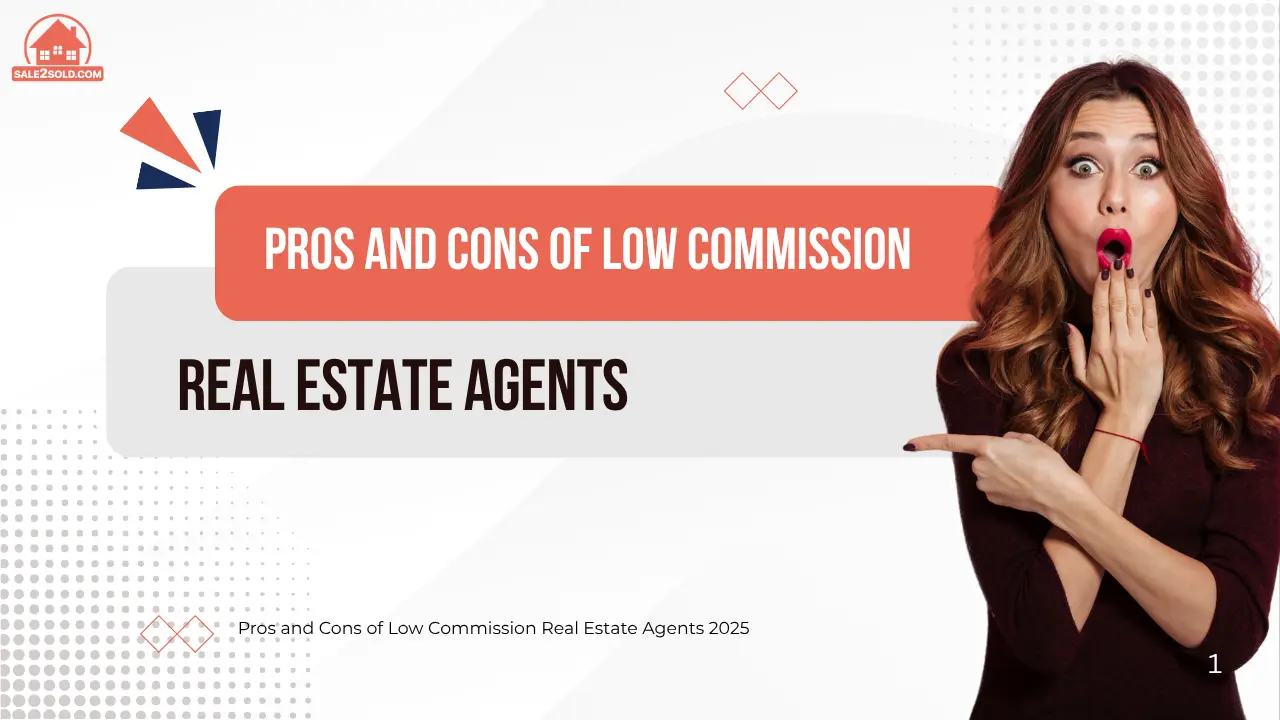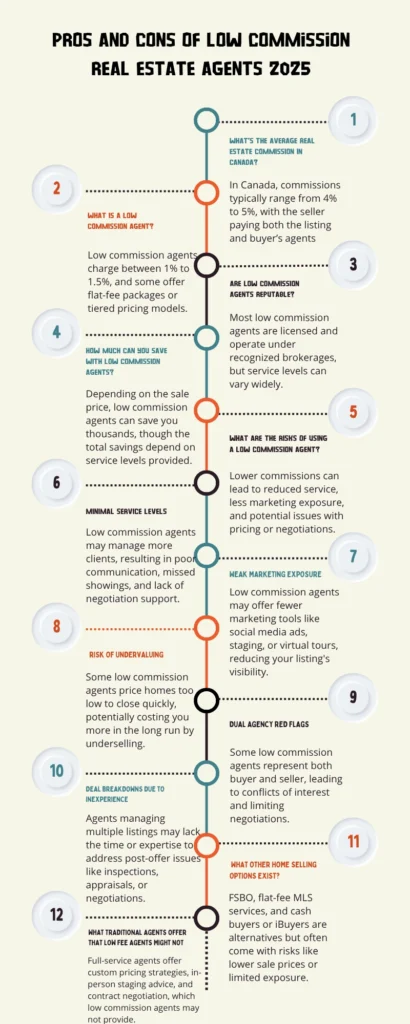Pros and Cons of Low Commission Real Estate Agents 2025


Selling a property often comes with significant costs, and real estate commissions are among the highest. Traditionally, agents take a percentage of the home’s sale price, which can become especially costly with high value homes. To cut down on these expenses, many homeowners are turning to Low Commission Real Estate Agents, who provide similar services at a much lower rate than standard agents. While this approach can offer considerable savings, it also comes with its own set of challenges. In this article, we’ll examine the advantages and disadvantages of working with Low Commission Real Estate Agents in 2025 to help you decide if it’s the right choice for your needs.
Table of Contents
ToggleLow Commission Real Estate Agents are professionals who offer their services at a lower fee than the standard 5 to 6% commission typically charged by traditional agents. Their rates usually range from 1 to 2%, depending on the level of service provided. This option appeals to sellers aiming to keep a larger portion of their home’s sale price, though it’s important to be aware of what comes with the reduced cost.
For example, on a property valued at $500,000, a standard 3% commission would amount to $15,000. A Low Commission Real Estate Agent charging 1.5% would bring that cost down to $7,500 resulting in a $7,500 savings. For sellers focused on maximizing their financial return, this difference can be quite impactful.
One of the biggest advantages of working with Low Commission Real Estate Agents is the potential for significant cost savings. Even a slight decrease in commission can result in considerable financial benefits, especially when selling higher priced properties. As the value of the home increases, the amount saved through reduced commission grows as well giving sellers more money to allocate toward future investments or personal expenses.
Compared to traditional agents, Low Commission Real Estate Agents often offer more flexibility when it comes to negotiating their fee structures. Sellers have the opportunity to explore various pricing options based on the level of service they need. For instance
Because they charge reduced fees, Low Commission Real Estate Agents often work with a larger number of clients, which can drive them to close deals more efficiently. Managing a higher volume of listings helps them develop a strong sense of urgency and focus on achieving faster results. This can be a major advantage for sellers who are looking to complete their home sale within a short timeframe.
While Low Commission Real Estate Agents offer their services at a reduced cost, they frequently still deliver a comprehensive range of support such as pricing advice, marketing efforts, negotiation handling, and transaction coordination. Sellers can take advantage of this professional expertise without paying high commission rates. This allows homeowners to experience the benefits of full service real estate assistance while keeping expenses manageable.
A common downside of choosing Low Commission Real Estate Agents is the possibility of receiving less individualized attention. Because they tend to manage a larger client base, they might not have the bandwidth to deliver the same level of one on one service that traditional agents often provide. For sellers who value regular updates and in depth guidance throughout the process, this reduced availability could be a concern.
Effective marketing plays a crucial role in selling a home. Traditional agents typically invest in premium marketing strategies like professional photography, staging, and virtual tours to maximize visibility. In contrast, Low Commission Real Estate Agents may have limited access to such resources, as their focus is often on keeping expenses minimal. As a result, sellers might encounter fewer marketing tools and reduced exposure, which could extend the time it takes to sell or lead to lower offers.
Not all Low Commission Real Estate Agents have the same depth of experience as seasoned traditional agents. Many are relatively new to the industry, which can pose challenges in areas like price negotiation, understanding local market dynamics, or navigating complex transactions. This lack of experience may leave some sellers at a disadvantage when unexpected issues arise, potentially making it harder to secure the most favorable outcome.
Traditional agents often bring strong negotiation skills and access to extensive networks, which can help secure the best deal for their clients. In comparison, Low Commission Real Estate Agents might have limited negotiating leverage because of their smaller client base and reduced fees. This can sometimes affect their influence during negotiations with buyers or other agents, potentially impacting the final sale price.
Although Low Commission Real Estate Agents can help reduce your overall selling costs, there’s a possibility that the final sale price might be lower than what a more experienced agent could achieve. Studies have shown that agents with more experience often those who charge higher commissions tend to close deals at better prices, thanks to their negotiation skills and wider buyer networks. If a low commission agent isn’t able to secure top dollar for your home, the initial savings on fees might not deliver long term value.
If you decide that working with Low Commission Real Estate Agents fits your goals, it’s important to evaluate a few key points before making your choice:
Deciding whether to hire Low Commission Real Estate Agents depends on your priorities. If saving on commission is your main concern, this route can be an excellent option. However, if you value personalized service, expert marketing, and strong negotiating skills, a traditional agent may provide more value, despite the higher commission.
The key is to evaluate the pros and cons and ensure that the agent you select has the experience and skills necessary to achieve your selling goals. With the right Low Commission Real Estate Agents, you can enjoy the savings while still receiving high quality service.